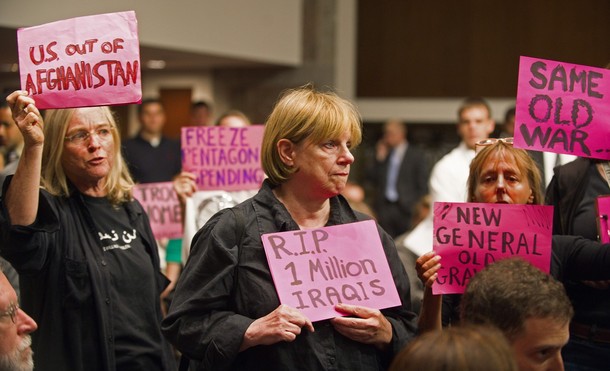
From Abby Phillip, Politico: As President Barack Obama formally declared an end to combat operations in Iraq this week, the anti-war movement that helped sweep him into office — and that worked for seven years to bring U.S. troops home — finds itself struggling for survival.
Several factors — war fatigue; a deep, lingering recession; and the presence of a Democratic president they helped elect — have drained the energy from organizations that led the fight against the Iraq war. Some of the most influential anti-war activist groups that once summoned half a million people to march against the Iraq war and the policies of former President George W. Bush are straining to raise the money and attention to fight what they see as Obama’s military entrenchment in Afghanistan.
“We don’t have a very vibrant anti-war movement anymore,” lamented Medea Benjamin, co-founder of Codepink, one of the anti-war movement’s most visible organizations. “The issues have not changed very much. … Now we have a surge [in Afghanistan] that we would have been furious about under George Bush, yet it’s hard to mobilize people under Obama. We have the same anti -war movement and not the same passion.”
MoveOn.org, which produced a 2007 anti-war newspaper ad labeling Gen. David Petraeus “General Betray Us” for the surge in Iraq, has largely been silent, despite a similar U.S. strategy in Afghanistan with Petraeus at the helm. Cindy Sheehan, perhaps the most famous anti-war protester, believes the peace movement is over. And United for Peace and Justice — once the largest of three major anti-war coalitions — has practically dissolved. …
In July, 102 House Democrats voted against the $33 billion emergency war supplemental bill, compared with 32 who voted against it last year — a sign, activists say, that Congress is responding to falling public support for the Afghanistan war. Activists took heart when House Speaker Nancy Pelosi said she would not whip progressive members to support this bill, and when House Appropriations Committee Chairman David Obey said he had “profound skepticism” about spending more money on combat in Afghanistan.
“I thought it was very telling that not a single member of Democratic leadership stood on the floor to defend the president’s Afghanistan policy during the supplemental debate,” said Tom Andrews, a former congressman from Maine who also is the national director of Win Without War. (photo: Getty)
Image: getty%209%206%2010%20antiwar%20protesters%20Code%20Pink.jpg

